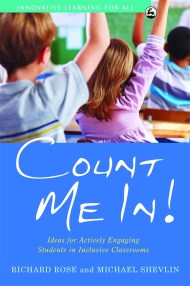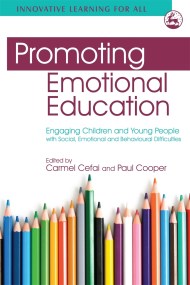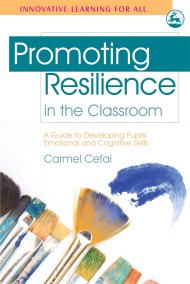Nurture Groups in School and at Home
On sale
15th April 2007
Price: £24.99
Genre
Society & Social Sciences / Education / Teaching Of Specific Groups & Persons With Special Educational Needs / Teaching Of Students With Emotional & Behavioural Difficulties
Selected:
ebook / ISBN-13: 9781846426001
This book explores the ways in which pupils with social, emotional and behavioural difficulties can be effectively engaged in schooling – either in school or at home. It explains the social and emotional underpinnings of learning and presents practical strategies for aiding engagement.
Nurture groups, originally devised and implemented in the 1970s, are specially designed classes that cater for pupils having difficulties in adjusting to the requirements of mainstream classrooms. Paul Cooper and Yonca Tiknaz present evidence of the success of nurture groups from the perspectives of the children participating in them, their parents and school staff members who manage nurture groups in schools, and examine what factors affect the success of the group. From this they draw key messages for effective practice, including the fundamental importance of recognising a child’s emotional needs and meeting them, and the pivotal role of the relationship between the teaching staff co-ordinating the group.
Nurture Groups in School and at Home will provide essential information and accessible advice for teaching professionals running nurture groups in schools and for parents and carers running them at home.
Nurture groups, originally devised and implemented in the 1970s, are specially designed classes that cater for pupils having difficulties in adjusting to the requirements of mainstream classrooms. Paul Cooper and Yonca Tiknaz present evidence of the success of nurture groups from the perspectives of the children participating in them, their parents and school staff members who manage nurture groups in schools, and examine what factors affect the success of the group. From this they draw key messages for effective practice, including the fundamental importance of recognising a child’s emotional needs and meeting them, and the pivotal role of the relationship between the teaching staff co-ordinating the group.
Nurture Groups in School and at Home will provide essential information and accessible advice for teaching professionals running nurture groups in schools and for parents and carers running them at home.
Newsletter Signup
By clicking ‘Sign Up,’ I acknowledge that I have read and agree to Hachette Book Group’s Privacy Policy and Terms of Use
Reviews
I would recommend this as a useful book for all Educational Psychology Service libraries and, if you can, get schools, who are nurturing, innovative and who put the emotional health of their children and families before results, to read it too.
The gentle pace of the book does not detract from its clear message: there is no blame; no fault; only unhappy children and desperate parents and teachers. Each chapter is clearly defined and the main points summarised, making its content accessible. Indeed, one of the book's greatest strengths is the importance placed on the role of the carer and professional working together and not in isolation. I would have no hesitation in recommending it to any adult involved with nurture groups of interested in the underpinning principles of how a child learns.
The book provides essential information and advice for teaching professionals who run nurture groups and for carers running them at home. I would have no hesitations in recommending it to any dult involved with nurture groups or interested in the underpinning principles of how a child learns.
I was impressed by the book's structure and accessible format at each chapter is succintly introduced and summarised, easing the reader's ability to make sense of the concepts. Any therapists working alongside schools in supporting youn people with mental health problems, this book has much to offer.
Back in the 1970s someone came up with a very good idea; provide specially-designed classes for students who have difficulty adjusting to the mainstream, staff the classes with techers trained in nurturing and meeting the needs of these special students, and engage a range of educators, parents, and peers to create a supportive environment that is student-centred. According to Cooper (education,U. of Leicester} and Tiknaz {rising educational achievement, U. of Leicester) such nurture groups are effective in the classroom and in the home at bringing children with social, emotional, and behavioural needs closer to accepting educational and other experiences. Writing for educators and parents, they describe nuture groups and what school staff about them, the role of caring people in nurture groups, selection of students for groups, research indications, models for analyzing problems situations and key messages for practitioners.





